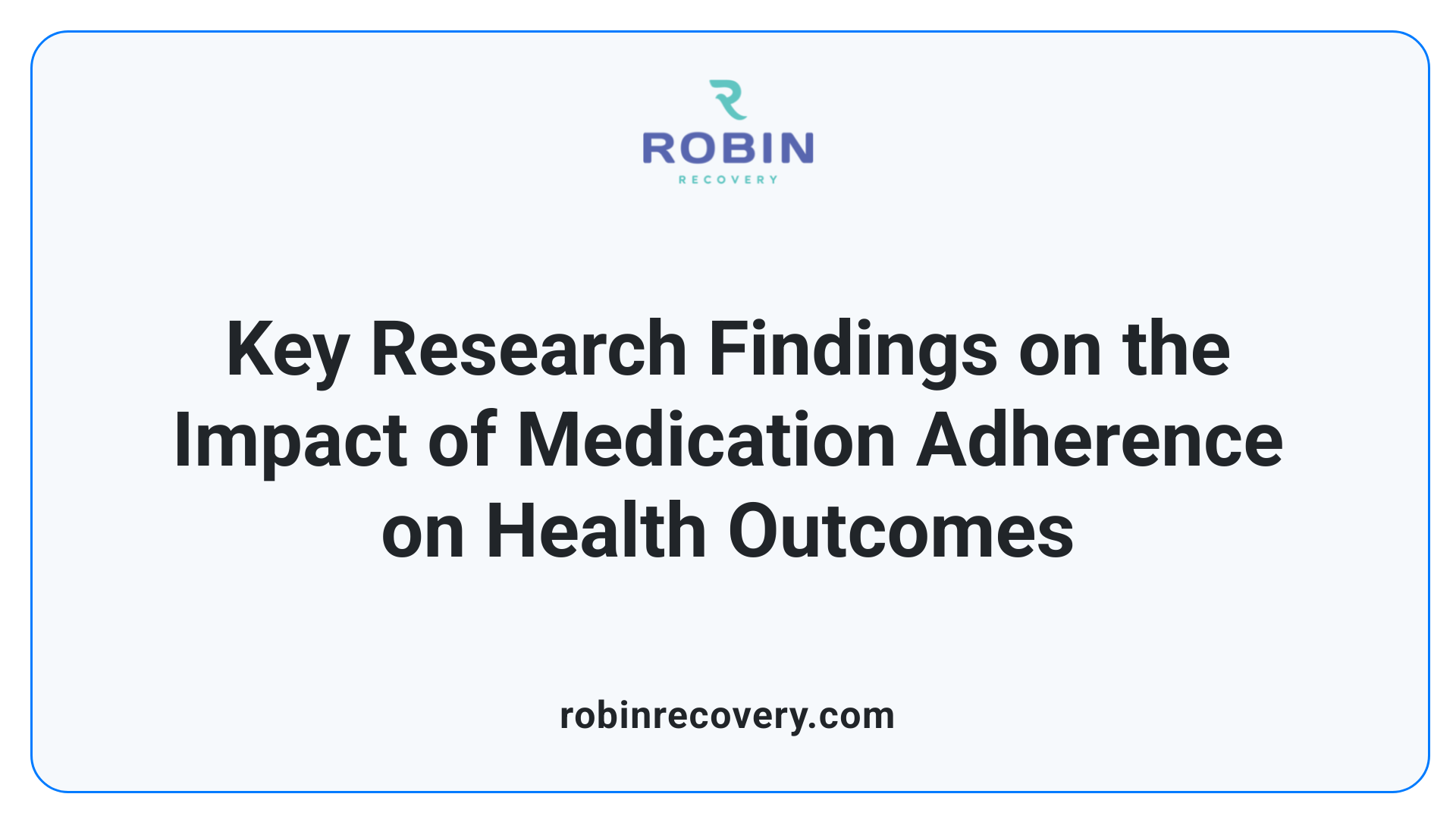The Importance of Medication Compliance in Recovery

Introduction
Medication adherence is a pivotal aspect of effective healthcare, especially in the context of recovery from various health conditions. Adherence refers to the degree to which a patient correctly follows medical advice, including timing, dosage, and frequency of medication intake. This article explores why medication compliance is critical, examines the factors influencing adherence, and discusses strategies for improving compliance in recovery settings, supported by relevant studies and research.
The Significance of Medication Compliance

Definition of Medication Adherence
Medication adherence refers to how well patients stick to their prescribed medication regimens, including timing, dosage, and frequency of intake. This congruency with healthcare provider recommendations forms the backbone of effective treatment strategies.
Impact of Medication Adherence on Health Outcomes
Adherence is pivotal for improving health outcomes. When patients follow their medication plans diligently, they are more likely to experience better management of their diseases and improved quality of life. Conversely, nonadherence can lead to disease progression, increased rates of hospitalization, and even death. It’s estimated that nonadherence results in approximately 125,000 deaths annually in the United States alone, highlighting the gravity of this issue. Additionally, effective management through rigorous adherence can lead to reduced healthcare costs, mainly due to fewer hospital visits and less reliance on emergency care.
Effect of Noncompliance
Noncompliance can take various forms, including forgetting doses, outright refusal to take medications, and not refilling prescriptions. Studies show that nearly 50% of medications prescribed for chronic conditions are not taken as directed. This lack of adherence strains healthcare resources, leading to an estimated $300 billion in unnecessary spending each year. Moreover, noncompliance can exacerbate existing health issues, contributing to a vicious cycle of deterioration and increased healthcare needs. Thus, understanding the significance of medication adherence is crucial for both patient health and system efficiency.
Consequences of Medication Non-Adherence

What are the consequences of medication non-adherence?
Medication non-adherence has significant repercussions for both patients and the healthcare system. Firstly, failing to take medications as prescribed can lead to the aggravation of existing health conditions. For instance, patients with chronic diseases like hypertension or diabetes may face increased symptoms, deteriorating health, and a higher likelihood of complications such as heart attacks or strokes.
Economic impact of non-adherence
The economic repercussions of medication non-adherence are also substantial. Studies show that the U.S. healthcare system loses approximately $300 billion annually due to avoidable hospitalizations and additional medical costs arising from untreated conditions. This is not just a burden on healthcare expenses, but it can also strain the financial resources of families dealing with chronic illnesses.
Impact on healthcare resources
Non-adherence further impacts healthcare resources. Patients who do not follow prescribed regimens have a much higher rate of hospital readmissions—up to six times more likely than those who adhere to their medications. This not only overloads hospital systems but also decreases the overall effectiveness of medical interventions.
Consequence Description Impact Level Aggravation of Conditions Worsening symptoms and complications leading to possible hospitalizations. High Economic Burden Increased healthcare costs leading to billions in losses annually. Very High Strain on Healthcare Resources Higher rates of hospitalization lead to overburdened healthcare systems. Critical
Medication Adherence in Mental Health Recovery
How does medication adherence affect recovery from mental health issues?
Medication adherence is crucial for recovery from mental health issues as it significantly impacts symptom control, quality of life, and the prevention of relapses. Effective adherence can lead to lower hospitalization rates and improved overall outcomes for patients.
For instance, individuals suffering from schizophrenia experience severe consequences with high rates of nonadherence, resulting in increased hospitalizations and exacerbation of symptoms. Research indicates that over half of patients with schizophrenia exhibit poor medication compliance, underscoring the need for targeted interventions.
Bipolar disorder also sees similar trends, with nearly one-third of patients showing nonadherence in recent studies. These findings illustrate how skipping medication can directly affect stability, increasing the likelihood of mood swings and other complications.
Factors enhancing adherence in mental health
Several factors are known to enhance medication adherence among individuals with mental health disorders:
- Patient Education: Educating patients on the importance of consistently taking their medications can mitigate misunderstanding and doubts.
- Social Support: A strong support network can reinforce the medication-taking process, providing encouragement and accountability.
- Provider Engagement: Open communication between healthcare providers and patients fosters trust, making individuals more likely to adhere to prescribed treatments.
- Simplified Regimens: Reducing the complexity of medication schedules can help patients avoid confusion and improve compliance.
In summary, fostering therapeutic adherence through supportive environments and patient-centered approaches is essential for improving recovery outcomes in mental health care.
Adherence in Substance Use Disorder Recovery

Challenges of adherence in substance use disorders
Medication adherence in individuals recovering from substance use disorders (SUDs) poses significant challenges. High rates of non-compliance, often resulting from complex regimens and the psychological burden associated with addiction, hinder effective treatment outcomes. Patients may struggle with fear of dependency and side effects, leading to intentional non-adherence. Additionally, a lack of support and understanding about treatment can make it harder for patients to follow through on their medication plans.
What strategies can improve medication adherence during recovery from substance use disorders?
Improving medication adherence during this critical recovery phase can be spurred by several effective strategies:
- Provider and Patient Education: Educating both healthcare providers and patients about medication purposes and potential side effects enhances understanding.
- Communication Enhancements: Implementing systems that send reminders through texts, calls, or applications fosters accountability and reinforces routine.
- Simplified Treatment Regimens: Streamlining medication regimens helps reduce the complexity and enhances adherence.
- Community Engagement: Collaborating with community organizations can build trust and provide necessary resources, including financial support for medications.
- Psychosocial Integration: Combining medication with behavioral therapies not only addresses physical dependence but also supports mental health, which is essential for sustained recovery.
Importance of medication-assisted treatment
Medication-assisted treatment (MAT), particularly with medications like buprenorphine, has proven effective in treating opioid use disorder. Adhering to MAT significantly reduces opioid use and decreases the likelihood of hospitalizations. Studies show that patients who consistently follow their medication regimen while engaged in therapy show improved overall health outcomes, underscoring the necessity of adherence for successful recovery.
Research Findings on Adherence Impact

Are there studies supporting the impact of medication adherence on recovery outcomes?
Yes, research consistently highlights the vital role of medication adherence in influencing recovery outcomes. Studies indicate that patients who adhere to prescribed regimens experience better management of their conditions, leading to improvements in their overall health and well-being.
Statistical findings related to adherence
Research demonstrates that medication nonadherence is pervasive, with only about half of patients in developed countries taking their medications as directed. Specifically, noncompliance can lead to significant complications: it's estimated that poor adherence contributes to 125,000 deaths annually and costs the healthcare system around $300 billion each year. The rates of nonadherence are alarmingly high in chronic conditions, with patients often missing up to 50% of prescribed medications.
Correlation between adherence and lower hospitalization rates
Furthermore, adherence is correlated with lower hospitalization rates. Studies show that patients who consistently follow their medication plans lower their readmission risk significantly—non-adherent patients are six times more likely to be readmitted compared to those who comply with their prescriptions. This correlation indicates that strategies for improving patient adherence are crucial for reducing healthcare costs and enhancing recovery.
In summary, strong evidence exists illustrating that improving medication adherence can lead to better health outcomes, reduced hospitalizations, and overall improved recovery trajectories.
Conclusion
Medication adherence is a cornerstone of effective healthcare and successful recovery from various health conditions, be they chronic illnesses or mental health disorders. The importance of adhering to prescribed therapies cannot be overstated—it boosts the chances of recovery, reduces the risk of complications, and alleviates the strain on healthcare systems. Addressing the factors that influence adherence, employing strategies to overcome barriers, and fostering a supportive therapeutic environment are integral steps towards improving patient outcomes and overall health management. As research continues to underscore the profound impact of medication compliance on recovery, implementing these findings in clinical practice remains essential for healthcare professionals and patients alike.
References
- Medication Adherence and Compliance: Recipe for Improving ...
- Patient Medication Adherence: Measures in Daily Practice - PMC
- Supporting Medication Compliance for People Living with Mental ...
- Medication Adherence: Taking Your Meds as Directed
- The Importance of Staying Medication Compliant After Rehab
- The Crucial Role of Medication Adherence in Recovery
- The Effects of Compliance in Medication Assisted Treatments
